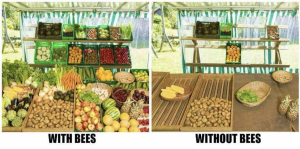This is The ChangeUnderground for the 7th of February 2022.
I’m your host, Jon Moore
Decarbonise the Air, Recarbonise the Soil!
As this pod enters its seventh year, I can see some patterns from the last six.
 The big one is the continued decline in honeybee populations and mass deaths following spraying events. I’ve added a photo to the show notes on the website: https://worldorganicnews.com/episode286/ showing which foods would drop from the supply chain, as we say these days, if our pollinators went missing. “Went missing”, if we killed them off through our own inability to respond to reality.
The big one is the continued decline in honeybee populations and mass deaths following spraying events. I’ve added a photo to the show notes on the website: https://worldorganicnews.com/episode286/ showing which foods would drop from the supply chain, as we say these days, if our pollinators went missing. “Went missing”, if we killed them off through our own inability to respond to reality.
And the bee question is a microcosm of our planet. Continue reading →
